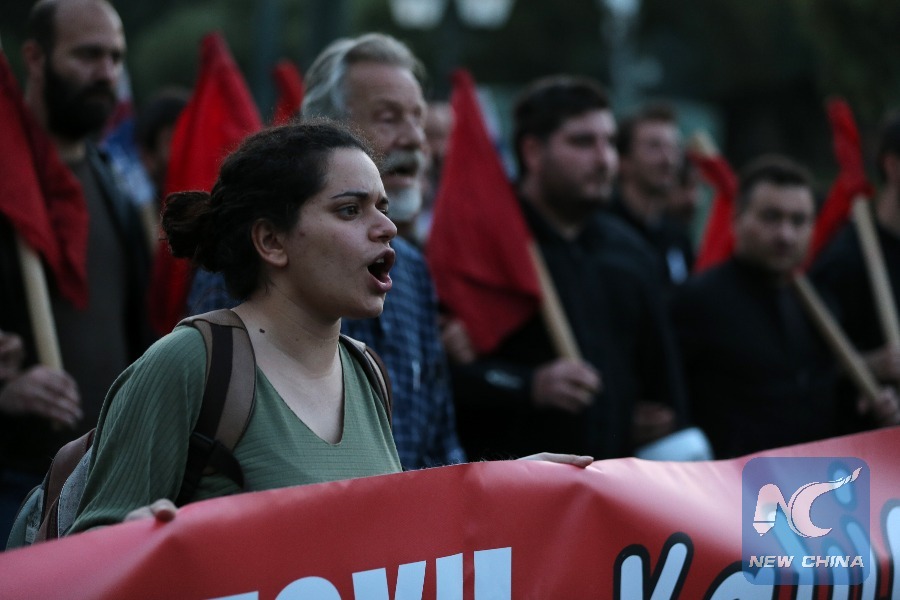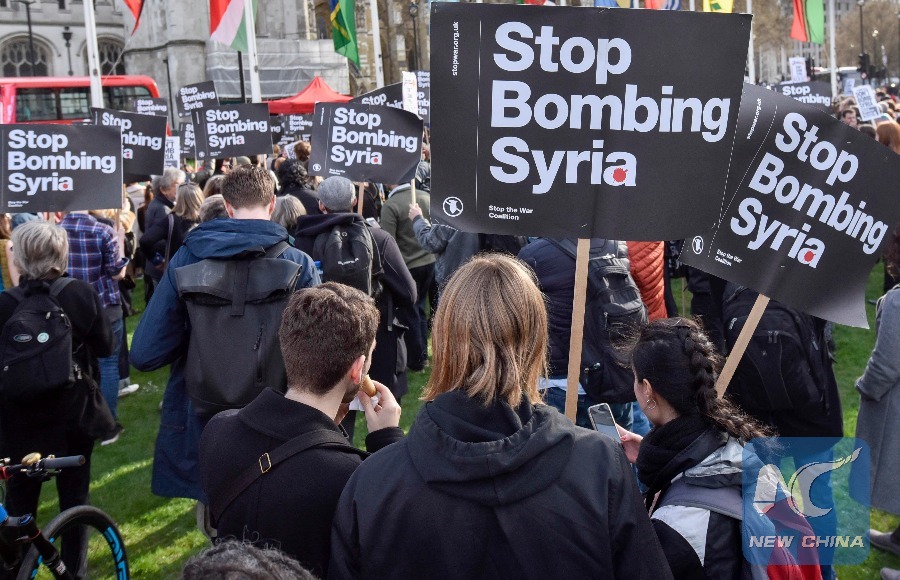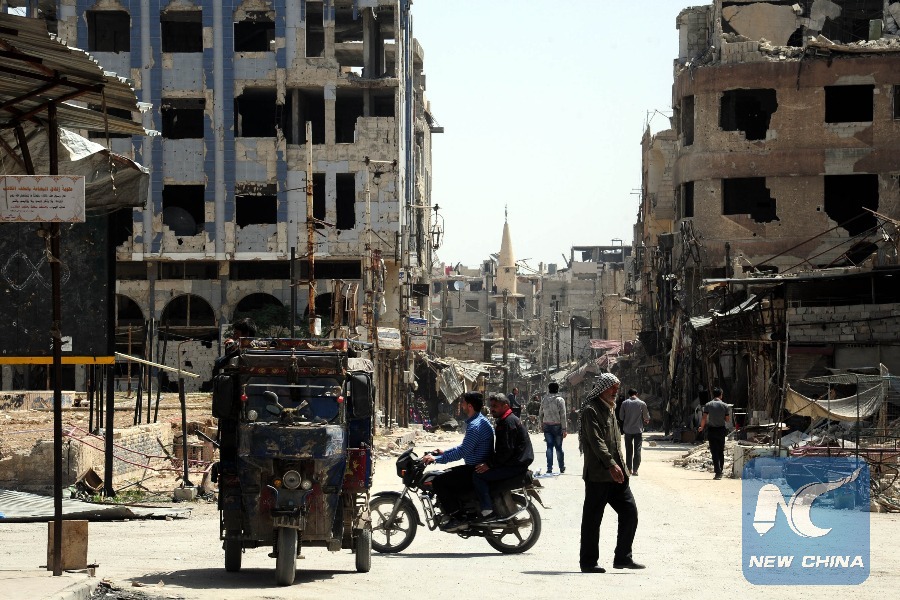
A demonstrator shouts slogans during a protest against a coalition missile strike in Syria launched by the U.S., France and Britain, in Athens, Greece, on April 17, 2018. (Xinhua/Marios Lolos)
by Xinhua writer Zheng Jianghua
BRUSSELS, April 19 (Xinhua) -- Though the dust raised by the joint Western airstrikes on Syria is settling, its shockwaves continue to ripple through the European continent.
Pinning the blame on the Syrian government for the alleged chemical attack on the rebel-held town of Douma on April 7, the United States, Britain and France have gushed over the self-righteous decision to launch the airstrikes on Saturday and flaunted the "success" of the "one-off" mission afterwards.
Nonetheless, a large swathe of Europeans took the strikes with a pinch of salt.
With the lessons of bumpy western intervention in Iraq, Afghanistan and Libya lingering fresh in mind, they queried the flawed justification and effectiveness of the airstrikes, and made a sideswipe at western hypocrisy.
UNJUSTIFIED AIRSTRIKES
Antonis Stylianou, a law professor at University of Nicosia in Cyprus, told Xinhua that the use of military force in international relations is justified in only two cases: when the force has been authorized by the United Nations Security Council or when the force is used in self-defense.
"Neither was the case of using military force against Syria," he stressed.
Refuting British Prime Minister Theresa May's allegation that the legal base for the use of force against Syria was protecting the Syrian population from chemical attacks, he said: "This justification will open the bag of Aeolus (god of the winds) in international relations."

Anti-war demonstrators protest against a coalition missile strike in Syria launched by the U.S., France and Britain, at the Parliament Square in London, Britain, on April 16, 2018. (Xinhua/Stephen Chung)
The professor was referring to a Greek Homeric phrase which indicates stirring up a storm.
The glaring lack of international mandate of the airstrikes has registered with not only academics but also a string of political figures in Europe.
Czech President Milos Zeman condemned the strikes on Saturday, announcing that "a military solution to the situation should be the last thing to do."
Former Croatian President Ivo Josipovic also cast doubt over the legitimacy of the airstrikes in an interview with Xinhua.
"I think it was supposed that an independent international investigative body would have to check the allegations of using chemical weapons," he said.
"Collective measures should have been taken only when it was confirmed that chemical weapons were used," he added.
It's noticeable that the U.S.-led coalition rushed to launch the airstrikes on the day when investigators of the Organization for the Prohibition of Chemical Weapons (OPCW) arrived in Syria, without waiting for their fact-finding report.
EFFECTIVENESS IN DOUBT
Aside from far-fetched justification, the airstrikes also met with torrents of criticism on its effectiveness.
The U.S. military announced that they fired 105 missiles targeting three facilities and set back Syria's chemical weapons program by years.
But the Russian Defense Ministry revealed on Monday that the Syrian forces, equipped with Soviet-era air defense systems, intercepted 71 out of the total missiles launched by the U.S-led coalition.

Surface-to-air missiles are seen over Syria's capital Damascus on April 14, 2018, as the Syrian air defenses were responding to U.S. attacks. (Xinhua/Ammar Safarjalani)
The ministry added that the real targets of the joint missile strikes on Saturday were Syrian military facilities, including airfields, in addition to the three targets announced by the United States and its allies.
Even before Russia's revelation, European political bigwigs have queried the effectiveness of the action. Finnish President Sauli Niinisto said that the attack does not solve anything but only has a "punishment character."
During an interview aired by Finland's national broadcaster Yle on Saturday, Niinisto reminded that a similar attack last year resulted in no impact.
In Scotland, First Minister Nicola Sturgeon said "airstrikes have not resolved the situation in Syria so far -- nothing I've heard persuades me they will do so now."
Moreover, a poll conducted by British pollster Survation on Sunday revealed that 40 percent of British adults opposed May government's participation in the joint strikes, while 36 percent supported it and 24 percent said they "don't know."
For military analysts, the airstrikes were more of propaganda than meaningful military actions.

Syrians are seen in a street in Douma district, east of Damascus, Syria, on April 18, 2018. (Xinhua/Ammar Safarjalani)
Tomas Nagy, an analyst of GLOBSEC Policy Institute, which is based in Bratislava, Slovakia, noted that Trump wanted to become a more assertive actor in the Syrian crisis, but the airstrikes were strictly limited in scope, and "their media impact is significantly more pronounced than any real military-strategic meaning at the moment."
Echoing the view, Aleksandar Radic, a military analyst from Serbia, said that "the missiles were just a way to demonstrate to the media that they have the strength to impose their political will."
"U.S. military actions ... were first of all a mean of propaganda, and not a military offensive intended to change the balance of power in Syria," he said.
WESTERN HYPOCRISY
There is much behind the facade of the airstrikes and a salient fact is the Western hypocrisy, a pundit pointed out.
Patrick Cockburn, a veteran journalist and award-winning writer for British newspaper The Independent, who covered Middle East news since the 1980s and forecast in 2014 the rise of terrorist group Islamic State before it became well-known, said ending the Syrian war is the only way to reduce civilian casualties, and everything else is hypocrisy and pretense.
"What is really killing people in Syria is the war which western powers stoked year after year with the intention that neither side would win," he underlined.
He said if foreign leaders showed any real concern over seven years of butchery in Syria, they would have made greater efforts in the past to bring this horrendous war to an end.
The airstrikes "was more of a gesture of disapproval than an attempt to damage" Syrian President Bashar al-Assad's military forces, he said, adding that "it does nothing to bring nearer the end of the war."
(Wang Yi in Prague, Zhang Zhang in Nicosia, Qu Xi in Bratislava, Li Jizhi in Helsinki, Yuan Liang in Sarajevo, Gao Lei in Zagreb, Gui Tao in London, Yuan Yun in Valletta and Tian Dongdong in Brussels contributed to the story.)

